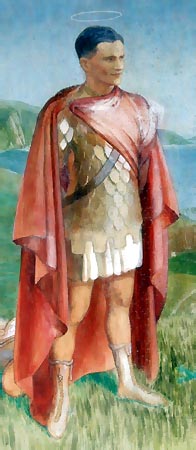 |
 |
|||
|
|
Hoel the Great is only known from Geoffrey of Monmouth's 12th century 'History of the Kings of
Britain', where he appears as the son of King Budic
of Brittany and the sister of the famous High-King Arthur
of Britain. In the Welsh translation of this work, known as the 'Brut y Brenhinedd' (or Chronicle
of the Kings), Budic's name is translated as Emyr Llydaw (meaning 'Emperor of Brittany').
Giving Hoel an alternative patronage suggests that he was a distinct character known to Welsh tradition of the time, although he appears
in no other surviving works. Geoffrey seems to have seen a pedigree of this man's descendants as he lists
several more generations of the family who he took to be Kings of Brittany. There was, however,
no overlordship of Brittany in the 7th century and they may perhaps have been a younger branch
of the Royal House of Cornouaille.
Hoel's father, Budic of Cornouaille, is probably the man of this name who the 'Life of St. Euddogwy' tells us
was exiled to the court of King Aergol Lawhir of Dyfed.
For it is in that kingdom that Hoel is revered as a saint at the church he traditionally
established at Llanhywel, just north of Solva.
Geoffrey of Monmouth related many stories of Hoel's heroism after he
was asked to send an army to help his uncle overcome the Anglo-Saxon scourge.
Hoel is said to have landed at Southampton and immediately moved north with a
considerable army to assist King Arthur at the Battle of Dubglas, the
Siege of Caer-Ebrauc (York) and the Battle of Celidon Coit, before being
besieged himself at Caer-Brithon (Dumbarton Rock). Hoel's greatest hour,
however, was at the triumphant Battle of Mount Badon. Later he took part
in Arthur's continental campaigns, conquering Gaul and enabling Arthur to
establish his government in Paris. Hoel then returned to his own Kingdom,
where King Tristram of Lyonesse was
supposed to have helped him to victory during a Breton Civil War. Whatever
estates Hoel owned in Brittany, he was traditionally succeeded in them by
his son, Hoel Fychan (the Younger).
Literary writers have transformed this character into Sir Howel,
a Knight of the
Round Table.
Hoel only appears in Geoffrey of Monmouth's 'History of the King's of Britain' and is generally considered legendary. |
|||
| © Nash Ford Publishing 2001. All Rights Reserved. | ||||





 Hoel Mawr, 'King of Brittany'
Hoel Mawr, 'King of Brittany'